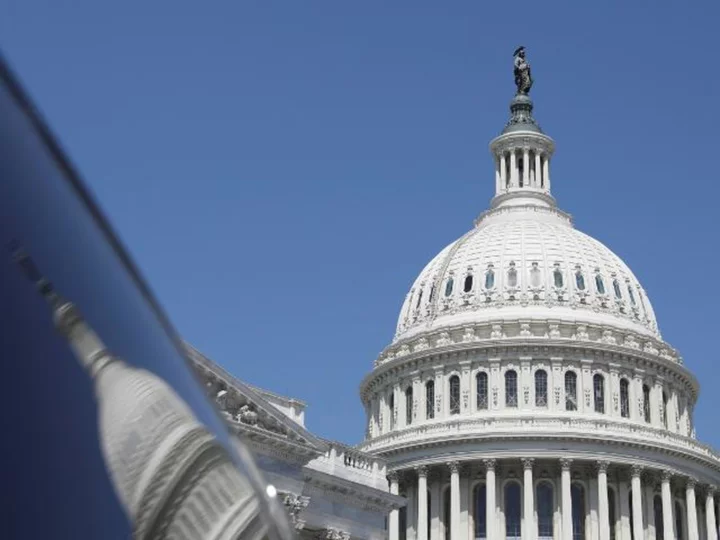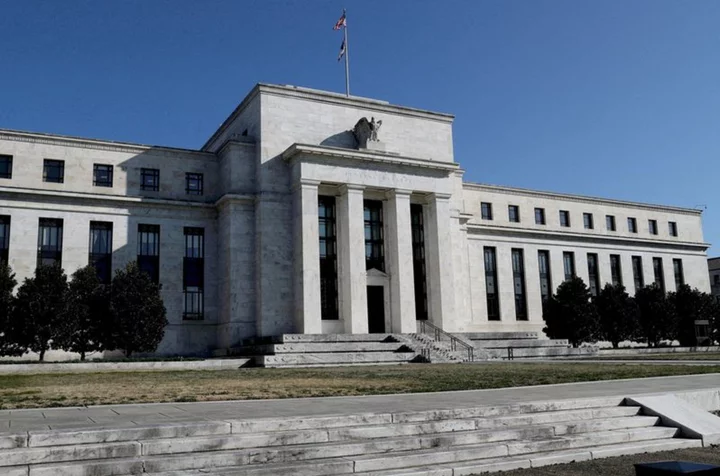Just six days remain before America could run out of money to pay its bills in a calamity that could trigger a recession and global economic turmoil. Deep divisions remain between the White House and House Republicans over a potential deal under which Congress would vote to raise the government's borrowing limit in exchange for capping spending.
Even as negotiators from both sides Thursday worked to narrow the gaps, the first signs of potential damage to the economy -- like the early bands of rain before a major hurricane -- began to sweep into Washington.
Credit ratings agency Fitch placed the top-ranked US credit on a negative watch, effectively warning it could downgrade US debt if lawmakers cannot pass a bill -- a move that could permanently raise the cost of federal borrowing and reverberate through the economy. And the 30-year fixed mortgage rate rose to 6.57% because of uncertainty over the looming debt crisis. The reality is also beginning to dawn that if the US is unable to borrow more money on or around June 1, Social Security payments for millions of seniors could be quickly disrupted.
As the early warning signs increased, it also became clearer how complex it would be to get any deal reached by Biden and House Speaker Kevin McCarthy through Congress at all -- let alone in time to avert an economic disaster. In a new complication, far-right Republicans warned they would not vote for any deal that watered down their wish list of demands already passed by the House, which are unacceptable to Biden and the Democrats who control the Senate. This is a significant threat since McCarthy can only afford to lose four votes to pass a bill given the GOP's narrow majority in the chamber.
In a letter to the speaker, a bloc of 35 hardliners issued new demands -- including provisions to beef up border security and a halt to a plan for new headquarters for the FBI, which pro-Donald Trump conservatives accused of persecuting the former president for political reasons.
Republican Rep. Byron Donalds of Florida warned that his could be a hard vote to get if a final agreement didn't line up closely with previous GOP demands. "What I am trying to really stress is at some point, the American people do need to understand exactly what's happening in this room because if a deal is made just to try to save face on both sides of the aisle, history tells us that is a terrible thing," Donalds said.
Some House Democrats, meanwhile, are registering dismay at the White House's strategy, making clear that they believe Biden may get rolled in the talks after previously refusing to negotiate with Republicans he accused of holding the economic well-being of millions of Americans hostage. Democratic dissent is noteworthy because if McCarthy can't unite his entire conference behind a deal, he may need support from moderate Democrats to pass a bill -- though such a step might risk an attempt by hardline Republicans to topple him.
Democrats are now warning that their support for a deal isn't guaranteed. In a closed-door meeting on Thursday, Pennsylvania Rep. Susan Wild told her caucus that the White House was taking House Democrats' votes for granted, CNN's Annie Grayer, Manu Raju and Melanie Zanona reported. She raised concerns about vulnerable members like herself being put in a politically precarious position by some of the White House's deal-making.
Democratic Rep. Emanuel Cleaver is one of many in his party opposed to Republican efforts to increase work requirements for social safety net programs, which could make it tougher for needy Americans to get benefits. The Missouri lawmaker told Raju that such steps would be a non-starter, "because most of the people we are talking about are people who are elderly and are children."
"One of the things I'm picking up from a lot of my colleagues today, and I'm surprised but pleased, many of these people are saying, you know, 'There shall be no surrender. We're not going to surrender,'" Cleaver said.
His comments underscored the fact that the more that radical Republicans demand concessions that are honored by McCarthy, the harder it will likely be for the speaker to get Democratic votes, if needed, to stave off a debt default.
Biden prepares the political ground for a deal
Under a potential agreement, the debt ceiling would be raised for two years while also capping federal spending -- except for defense and veterans spending -- for the same period, two sources familiar with the negotiations told CNN Thursday night. A separate source familiar with the negotiations said that the length of the spending caps is still being worked out.
Meanwhile, Biden had appeared to be preparing the political ground for any eventual deal with McCarthy that could prove unpopular with some rank-and-file Democrats. He tried to counter the impression Democrats could end up with nothing in return for Congress fulfilling its statutory duty of allowing the government to borrow more money to pay for spending it has already approved.
"I want to be clear that the negotiations we're having with Speaker McCarthy (are) about the outlines of what the budget will look like, not about default. It's about competing visions for America," Biden said, seeking to dispel the idea that he has dropped his refusal to negotiate over the debt limit while insisting he was, in fact, bargaining over the shape of long-term spending.
The president vowed to block what he said were "huge cuts" demanded by Republicans on important programs, including on the number of teachers and police officers. In this way, if Biden appears to have caved on some GOP priorities, he can still claim to have served as a champion of regular Americans as he sets out on his bid for reelection.
But Republicans have Biden -- who, as president, has obligations to protect all Americans rather than simply partisan motivations -- in an unenviable position. If he drives the negotiations with McCarthy to the brink and refuses to offer concessions, the economy could tumble over a cliff and shed millions of jobs and dip into a major recession. While the GOP could get blamed, the human toll would be massively painful for the country. Given his own weak political position -- Biden's favorable rating was 35% in a new CNN/SSRS poll released Thursday -- it's also clear that he can ill afford the political reverberations of a debt default.
Why signs of Republican discord could be a good sign
A source familiar with the negotiations told CNN that the administration and House Republicans are discussing a deal that would lift the debt ceiling through 2024 while placing caps on 12 annual spending bills that Congress must pass by the end of the year. Such a framework would at least spare Biden from another damaging run-in with the Republicans over the debt limit during his reelection year. And McCarthy could argue he's reined in what he says is the president's irresponsible spending.
But doubts remain whether such a compromise would satisfy either side in the House, meaning a nervous period could lay ahead for Biden, McCarthy, global markets and other world powers that are tied deeply to the US economy.
Still, one veteran observer of Congress, Rohit Kumar -- a former deputy chief of staff for Senate Republican leader Mitch McConnell -- said increasing criticism bubbling up from lawmakers may not necessarily be a bad omen.
"The fact that you have got 35 House Republicans, the House Freedom types, writing a letter saying we are not planning on voting for this thing, is actually a good sign. They were never going to be a coalition of the willing for a bill that is going to get signed into law through a Democratic Senate through President Biden's signature," Kumar told CNN's Jim Sciutto.
"So the fracturing at the extremes is actually a sign that a deal is coming together."
Seth Harris, a former deputy director of the National Economic Council under Biden, however, warned that Republicans were taking a "gigantic" risk with the economic well-being of millions of Americans.
"It shows that some of the extremists in the party are more interested in politics than making sure that Americans' lives come out well."









